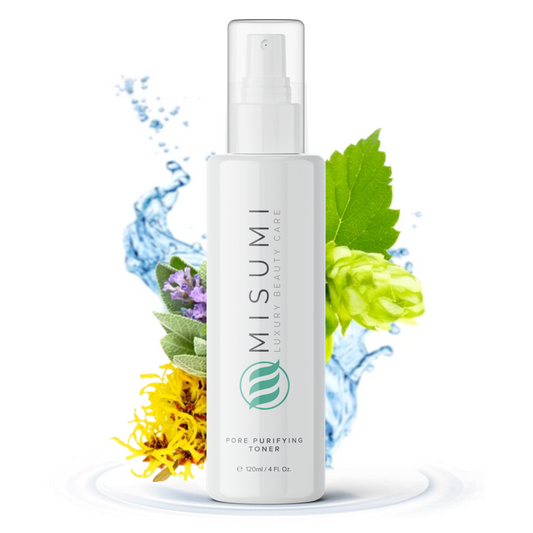Imagine this: You've just bought a new acne cream, touted as the latest miracle worker. You're hopeful, thinking maybe this is the one. But the next morning, instead of a clearer complexion, you're met with a painful chemical burn on your face from the acne cream.
What Causes These Burns?
Many skincare products, especially acne treatments, contain potent ingredients like benzoyl peroxide, glycolic acid, and salicylic acid. These chemical exfoliators are designed to remove dead skin cells, unclog pores, and rejuvenate the skin. However, for some, especially those with sensitive skin, these ingredients can cause more harm than good.
Recognizing a Chemical Burn

Most chemical burns, especially from a skincare product, might start as a tingling sensation. As hours pass, this can escalate to burning, redness, peeling, and severe pain. It's essential to differentiate between a mild skin irritation and a true chemical burn. The latter can lead to skin discoloration, severe swelling, and even long-term complications if symptoms are not addressed promptly.
First Aid: Immediate Steps to Take
- Cease Application: The moment you suspect a burn, stop using the product.
- Rinse Thoroughly: Use clean running water to wash off any residue. This step is crucial to prevent more damage.
- Avoid Aggravating the Skin: Refrain from scrubbing or rubbing the area.
- Soothe the Burn: Apply a cream with calming ingredients like aloe vera or centella asiatica.
When to Seek Professional Help
While many facial chemical burns from skincare products are mild, there are instances where medical attention is necessary. If you experience extreme redness, blistering, or if the pain becomes unbearable, it's time to visit the doctor, emergency department or a dermatologist.
They can provide guidance on how to treat chemical burns effectively and prescribe treatments like a low strength steroid cream or a topical antibiotic to aid in healing and prevent infection.
Prevention: The Best Cure
To avoid such traumatic experiences:
- Know Your Skin: Recognize your skin's sensitivity. Always patch-test new products.
- Educate Yourself: Understand the active ingredients in your skincare products. Potent ingredients can be beneficial but can also pose risks.
- Limit Product Mixing: Using multiple products with strong ingredients can amplify the risk of burns.
Ingredients to Watch Out For: Chemical Burns in Acne-Prone Skin

Acne-prone skin can be a challenge to manage. While many ingredients in skincare products promise clearer skin, some can cause more harm than good. Chemical burns, though rare, can be a painful consequence of using certain ingredients without caution. Here's a comprehensive guide to ingredients that can cause chemical burns, or an allergic reaction on acne-prone skin.
1. Alpha Hydroxy Acids (AHAs)
AHAs are popular for their exfoliating properties and are commonly found in skincare products. Examples include:
- Glycolic Acid
- Lactic Acid
While they can be beneficial in removing dead skin cells and unclogging pores, overuse or misuse can lead to skin damage, including chemical burns.
2. Beta Hydroxy Acids (BHAs)
BHAs, like salicylic acid, are another group of exfoliating acids. They penetrate deeper into the pores, making them effective against acne. However, just like AHAs, they can cause chemical burns if not used correctly.
3. Retinoids
Derived from vitamin A, retinoids such as retinol are hailed for their anti-aging and acne-fighting properties. But there's a catch: overuse or misuse can lead to skin damage, including chemical burns. It's crucial to follow the recommended usage and always wear sunscreen when using products containing retinoids.
4. Aluminum Compounds
Found in many antiperspirants, aluminum compounds can cause skin irritation, dryness, redness, and burning sensations, especially if overused.
5. Fragrance
While fragrances make products smell delightful, they can be a nightmare for sensitive or acne-prone skin. Overuse can lead to skin irritation, dryness, redness, and even burning sensations.
6. Sulfates
Commonly found in cleansers and shampoos, sulfates can strip the skin of its natural oils, leading to skin sensitivity, irritation, dryness, redness, and burning sensations.
7. Parabens
Used as preservatives in many skincare products, parabens can irritate the skin, cause inflammation, and exacerbate acne breakouts.
8. Oxybenzone
A common ingredient in sunscreens and some cosmetics, oxybenzone can clog pores and exacerbate acne breakouts. While it protects against UV rays, it's essential to ensure it doesn't counteract by causing breakouts.
9. Artificial Colors
While they make products visually appealing, synthetic dyes, like D & C Red, can be problematic. They can irritate the skin, cause inflammation, and increase the skin's sensitivity to sunlight, making sunburns more likely.
Navigating the world of skincare for acne-prone skin can be daunting. While many ingredients offer benefits, it's crucial to be aware of potential side effects. Always conduct a patch test when trying a new product and consult with a dermatologist if unsure. Remember, it's not about avoiding these ingredients entirely but using them wisely and in moderation.
The Road to Recovery
Healing severe burns from a chemical burn requires patience and care:
- Sun Protection: Sunscreen is non-negotiable. It prevents further skin discoloration and protects healing skin.
- Hydration: Drink ample water and moisturize your skin regularly.
- Avoid Potential Irritants: Until your skin heals, steer clear of other skincare products with potent ingredients.
The Ideal Face Cream for Acne-Prone Skin: Misumi Wrinkle-Free All Day Moisturizer

Acne-prone skin is a challenge that many face, often leading to a relentless search for the perfect skincare product. With a plethora of options available, finding the safest and most effective face cream can be overwhelming. Enter the Misumi Wrinkle-Free All Day Moisturizer.
Understanding Acne-Prone Skin
Acne-prone skin is sensitive and requires a product that not only hydrates but also addresses the root causes of acne. The ideal face cream should moisturize, soothe, protect, promote healing, and maintain the skin's natural pH. Misumi's Wrinkle-Free All Day Moisturizer is designed to do just that.
Why Misumi Wrinkle-Free All Day Moisturizer?
1. UV Protection with Zinc Oxide and Octyl Methoxycinnamate
Sun protection is crucial for all skin types, especially for acne-prone skin. The moisturizer boasts an SPF30 rating, thanks to the inclusion of Zinc Oxide and Octyl Methoxycinnamate. These ingredients are among the most effective UV protectors available. Notably, Zinc Oxide is a natural, non-toxic alternative to the harsh chemicals often found in sunscreens, making it ideal for sensitive skin.
2. Beeswax for Long-Lasting Moisture
Beeswax, a natural emollient, creates a barrier that helps the skin retain moisture. Its calming and soothing properties ensure that the skin remains soft, smooth, and free from irritation.
3. Palm Wax for Added Emollience
Also known as Carnauba wax, Palm wax is derived from the leaves of the palm tree Copernicia Prunifera grown in Brazil. This natural ingredient provides additional moisturizing properties and imparts a radiant shine to the skin.
4. Glycerin for Hydration and Protection
Glycerin is renowned for treating fine lines, wrinkles, and oily skin conditions like acne. Its exceptional anti-aging and healing properties ensure that the skin remains well-hydrated and nourished. Additionally, glycerin acts as a natural barrier, shielding the skin from irritants, pollutants, and environmental damage.
For those with acne-prone skin, Misumi Wrinkle-Free All Day Moisturizer offers a comprehensive solution. Its blend of powerful ingredients ensures not only clear skin but also addresses other skincare concerns like aging and sun protection. With such a product in your arsenal, achieving clear, radiant, and protected skin is not just a dream but a reality.
For more insights on skincare and navigating the complex world of beauty products, visit [https://misumiskincare.com/]. They offer a wealth of information tailored to various skin needs.
Wrapping Up

In the realm of skincare, the journey to clear, radiant skin can sometimes be fraught with unexpected challenges, like the distressing experience of a chemical burn from an acne cream. While the initial reaction can be alarming, understanding the steps to treat and recover is crucial.
While a chemical burn on face from acne cream can be distressing, there are ways to nurture your skin back to recovery.
Prioritizing immediate care, seeking professional guidance, and being gentle with your skin during the healing process can make a world of difference. It's also essential to be informed and cautious about the products we introduce to our skincare routine, ensuring they align with our skin's needs.
Remember, every setback is an opportunity to learn and grow. With the right knowledge and care, you can navigate the complexities of skincare and emerge with healthier, more resilient skin.








